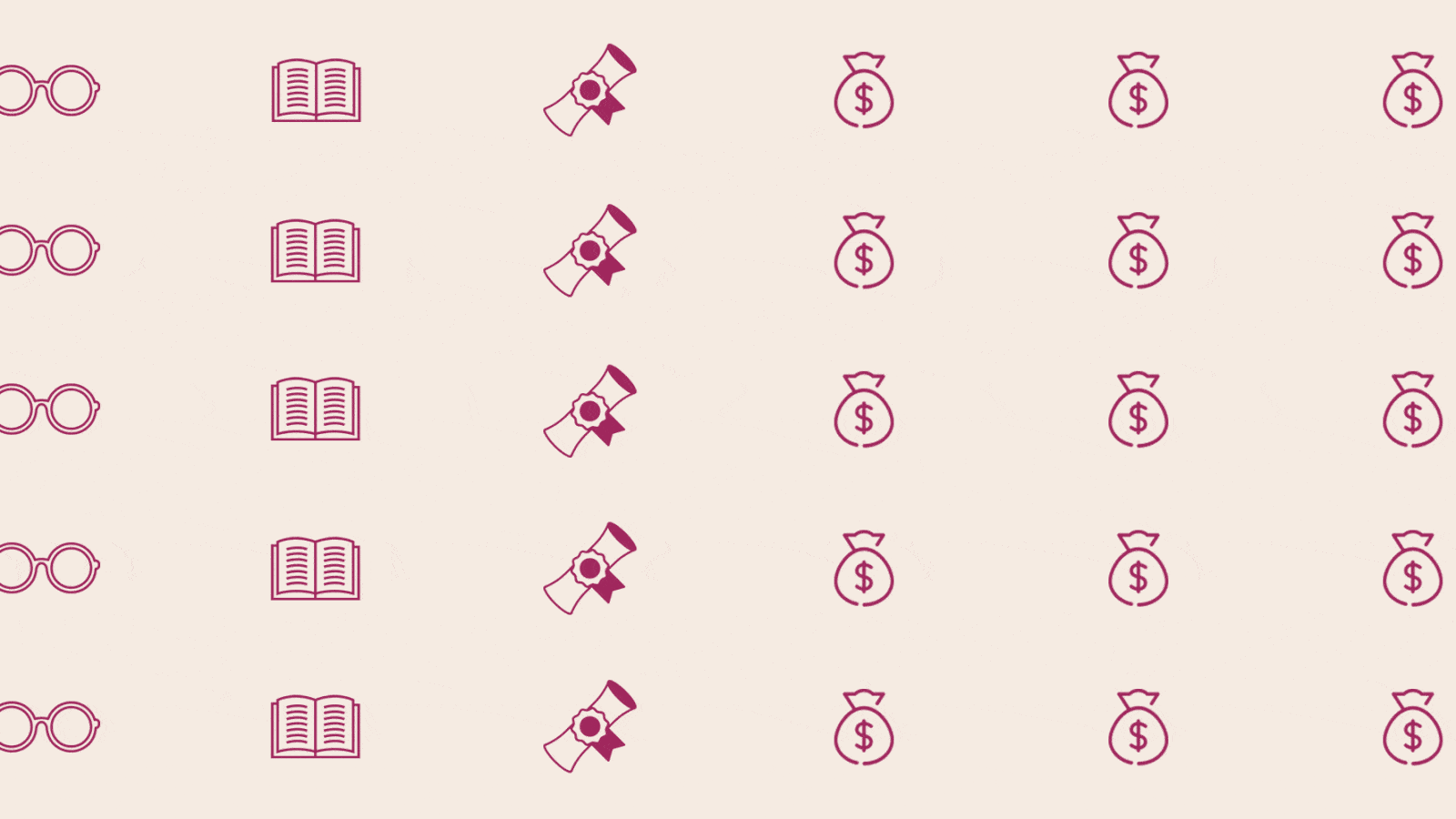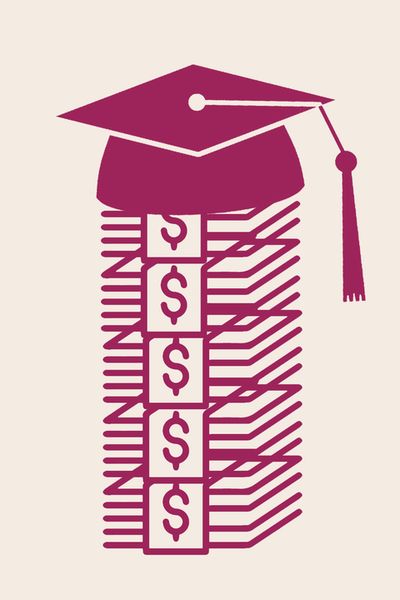Five Years, $23,000, Low Wages and Layoffs: Our Generation's Student Debt Despair

I thought I wouldn't get to go to college. It's not that I didn't think I'd get in—it's that the price was so far out of my range. It crippled me with doubt and sadness. Many of my friends' parents were covering their education in full, but mine couldn't.
I had a near-perfect GPA, but there were at least 30 almost-4.0s at my school. I went to the guidance office every week of my senior year to check for new scholarships or grants, but in the end, I knew where I'd end up: buried in student loan paperwork—and eventual debt—like so many other American college grads.
I ended up getting about 80 percent of my ride at Emerson College covered through a combination of scholarships, grants, and public and private loans. The remainder I paid for myself with some help from my mom. Four years later, I graduated with a degree in media production—and $23,000 of debt.

To me that was a serious sum, but the truth is, this was about the average for students at the time. I know people who left school with much heavier weights on their shoulders.
The average cost of a four-year public education in this country is more than $28,000 per year. A private institution will set you back nearly 60 grand annually. That number is estimated to be in the six figures by the 2020s. Seventy-five million millennials came of age as the economy was in or recovering from one of the worst recessions in U.S. history. Their incomes are 20 percent lower than what baby boomers earned at the same age. Many young people were overqualified for the low-paying jobs they were offered, but took them anyway to stay afloat and gain experience, which is not only harmful in the immediate, but can lead to huge financial losses over a lifetime. According to the Guardian, 20somethings are poorer than those in retirement age, with university bills to blame: "In the U.S., debt is the millennial millstone—young people are sitting on $1.3 trillion of student debt."
Making matters worse, Secretary of Education Betsy DeVos decided last month to strip away Obama-era protections for student loan borrowers. And in March, the Trump administration announced it would increase fees and penalties for students who default. With the deck stacked the way it is, it's no wonder over a million borrowers defaulted on their student loans last year.
I was terrified of becoming one of them. So I set a plan for myself: pay off all my debt within five years of graduating. That meant I needed to put up $4,600 a year or roughly $383 a month. I moved back home, as many of my contemporaries did, and worked as a substitute teacher while looking for something in my field. Being a sub in New Hampshire did not pay much—$70 a day, maybe less, if a slot was open. But I saved everything I could so that I could start paying down my loans before the interest-free grace period ended. Not having living expenses helped, as did not having a car (a challenge in New Hampshire). I pitched in with household expenses when I could, and stashed the rest away. I also wrote for a few websites (for free, unfortunately) to build up my portfolio.
Stay In The Know
Get exclusive access to fashion and beauty trends, hot-off-the-press celebrity news, and more.
In some ways, this penny pinching proved to be a massive benefit when disaster eventually struck. But in others it was kind of miserable—I regret skipping out on small joys and experiences. I was very strict with myself: I'd only buy clothing on sale. My boyfriend and I never went on a vacation. I beat myself up if I went out for a nice birthday dinner, or did anything fun. I didn't even have Netflix, because I was salvaging every buck I could. I checked DVDs out from the library instead.
Just before the end of 2009, I finally got a full-time gig as an audio production assistant and moved in with my sister near Boston. I was basically a contractor, so I didn't get vacation or sick days, but I did get great health insurance. Working 40 hours a week left me with about $900 a month to pay for food, utilities, and loans, after rent, taxes, and insurance.
Interest was taking a chunk out of my repayments, though. I realized I needed to be more strategic. Some loans may start out with more accrued interest (if the lender started charging interest when you received the money, rather than offering a grace period) and look more menacing, but others could have a higher interest rate and grow into a monster over time. Most of my government loans had an interest rate around six percent. I did all the research I could and found out that my estimated interest over time if I paid only the minimum amount each month would be just shy of $5,700 on $17,000 in government loans—that means I would be paying back almost 30 percent more than what I originally borrowed.
It's no wonder over one million borrowers defaulted on their student loans last year.
For a while I could only afford the minimum payment. Then, in February 2011, I decided to increase my usual $50 minimum payment on my private loan and pay back $1,300 instead. I did the same in March. By May of 2011, I was notified that my private loan of $6,000 was paid in full.
There is almost nothing in the world more satisfying than that. Except, of course, having no debt at all.
So I turned my attention to my government loans. In August, I made a payment of $400—about twice my minimum payment. That little dent helped, but not enough. Between April and May of 2012, I bit the bullet and paid off almost $4,000 of my loan. I had recently switched to an exciting new role at a music and gaming studio. I had good insurance. Things were on the up and up.
Or so I thought. Just a month later, I was laid off with one month's severance. I panicked. Why did I spend so much of my savings on my loan, instead of just making the minimum payment? I didn't know when I'd get another job. I filed for unemployment immediately.
But when I received my last severance check plus my unused vacation and sick pay, I ended up putting it toward my loan—another $2,000. I was so worried about things getting worse that I wanted to eliminate as much of my loan payments while I could.
Foolish? Perhaps, but I was desperate.
Within a month, my first employer hired me back as a freelancer and I was able to stay afloat. It wasn't easy. My cash flow depended on workflow, which sent my stress levels through the roof. I was tired and unhappy. I felt like I'd made financial mistakes and didn't see any good news on the horizon. Even with the work experience I had, I'd go on job interviews where I'd find the pay was just $10 an hour. At one point, paralyzing abdominal pain landed me in the hospital. Of course, that meant more bills.
I'd go through spurts of great freelance work, while other weeks would produce a nail-biting sum of only a few hundred dollars. I only spent money on rent, utilities, and the absolute minimum payment on loans, which had been reduced to $20 a month thanks to the substantial payments I'd made during the summer. I wished I'd been more calculated, instead of feeling such an intense desire to get rid of my loans ASAP.
I freaked out a bit. I applied to a job I didn't really want, at an office too far away, accepting a position I hadn't even interviewed for. I had a two-hour trek each way on public transit. I was miserable.
Focusing only on finances prevented me from enjoying life.
I was, however, making a decent amount of money. And with no spare time to spend it in, I stashed it all away. In March of 2013, I was able to put another chunk of money toward my loan. This left my remaining balance hovering at around only $2,000.
Then, a few short weeks later, I was laid off again. It would be more than six months before I found full-time employment. I skirted by on the minimum payment until June of 2014, when I shoved everything I had at was left of the government loans—around $1,750. It was like driving a stake into a bloodsucking vampire.
Those five years taught me that I can be financially strategic when I need to. But I've also learned that focusing only on finances prevented me from enjoying life. I put off a lot of things I wanted to do because I decided that paying off my loans was more important. Would I be okay now if I had paid the bare minimum, and gone on a weekend trip, bought something that wasn't on sale, or put my health above my finances? Probably.
I think my generation has become accustomed to feeling hopeless about money. I can't help but measure the price of large investments in years-at-college currency. The average American wedding is the equivalent of one year in college, FYI—and I just got engaged, so here we go again.
Follow Marie Claire on Facebook for the latest celeb news, beauty tips, fascinating reads, livestream video, and more.